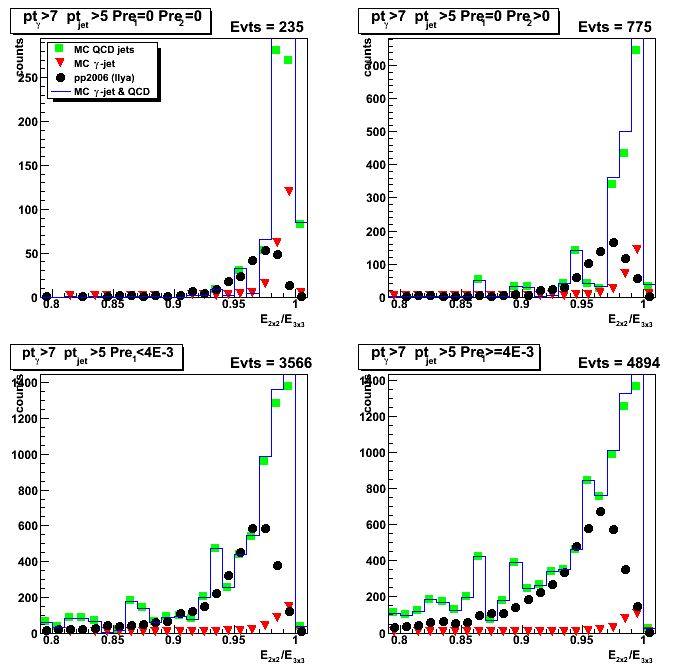2008.11.21 Energy fraction from 2x1 vs. 2x2 vs. 3x3 or 0.7 radius: rapidity dependence
Ilya Selyuzhenkov November 21, 2008
Data sets:
- pp2006 - STAR 2006 pp longitudinal data (~ 3.164 pb^1)
after applying gamma-jet isolation cuts (no R_cluster cut applied for this study). - gamma-jet[gamma-filtered] - data-driven Prompt Photon [p6410EemcGammaFilter] events.
Partonic pt range 2-25 GeV. - QCD jets[gamma-filtered] - data-driven QCD [p6410EemcGammaFilter] events.
Partonic pt range 2-25 GeV.
2x1, 2x2, and 3x3 clusters definition:
- 3x3 cluster: tower energy sum for 3x3 patch around highest tower
- 2x2 cluster: tower energy sum for 2x2 patch
which are closest to 3x3 tower patch centroid.
3x3 tower patch centroid is defined based
on tower energies weighted wrt tower centers:
centroid = sum{E_tow * r_tow} / sum{E_tow}.
Here r_tow=(x_tow, y_tow) denotes tower center. - 2x1 cluster: tower energy sum for high tower plus second highest tower in 3x3 patch
- r=0.7 energy is calculated based on towers
within a radius of 0.7 (in delta phi and eta) from high tower
Cuts applied
all gamma-jet candidate selection cuts except 3x3/r=0.7 energy isolation cut
Results
There are two sets of figures in links below:
- Number of counts for a given energy fraction
- Yield above given energy fraction
[figures with right integral in the caption]
Yield is defined as the integral above given energy fraction
up to the maximum value of 1
Gamma candidate detector eta < 1.5
(eta region where we do have most of the TPC tracking):
Gamma candidate detector eta > 1.5:
(smaller tower size)
Some observation
- For pre1>0 condition (contains most of events)
yield in Monte-Carlo for eta > 1.5 case
is about factor of two different than that from pp2006 data,
while for eta < 1.5 Monte-Carlo yield agrees with data within 10-15%.
This could be due to trigger effect? - For pre1=0 case yiled for both eta > 1.5 and eta < 1.5 are different in data and MC
This could be due to migration of counts from pre1=0 to pre1>0
in pp2006 data due to more material budget than it is Monte-Carlo - For pre1=0 condition pp2006 data shapes are not reproduced by gamma-jet Monte-Carlo.
With a larger cluster size (2x1 -> 3x3) the pp2006 and MC gamma-jet shapes
are getting closer to each other. - For pre1>0 condition (with statistics available),
pp2006 data shapes are consistent with QCD Monte-Carlo.
Cluster energy fraction in 3x3 patch: detector eta > 1.5
Energy fraction from NxN cluster in 3x3 patch: detector eta > 1.5
Figure 1a: 2x1/3x3 energy fraction [number of counts per given fraction]

Figure 2a: 2x2/3x3 energy fraction [number of counts per given fraction]


